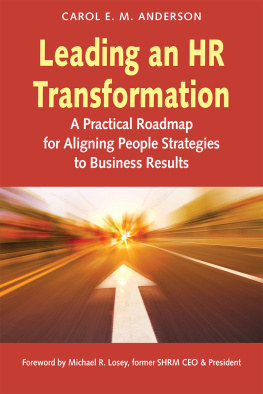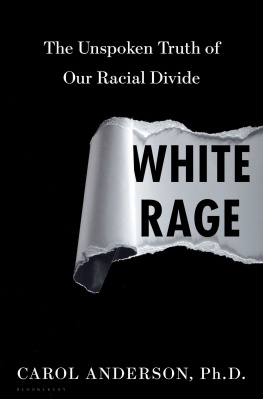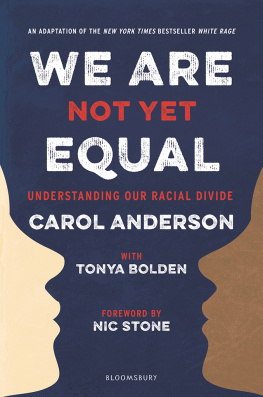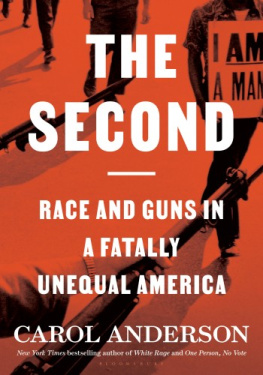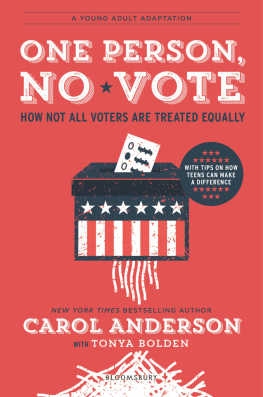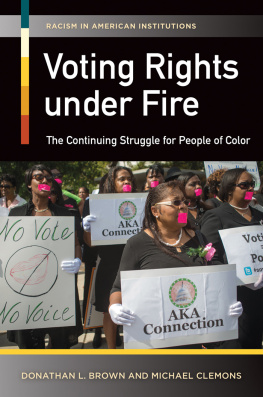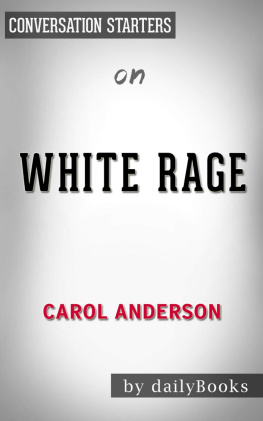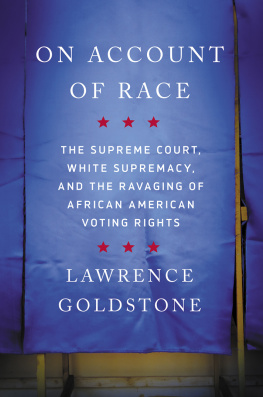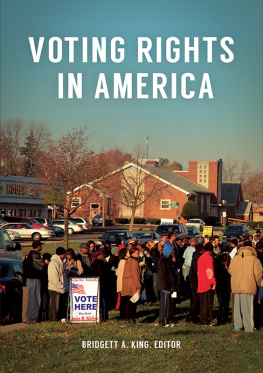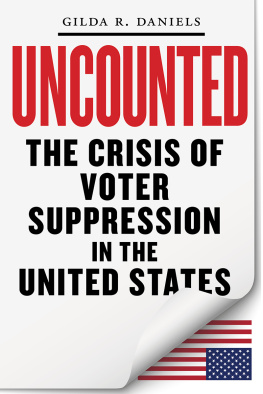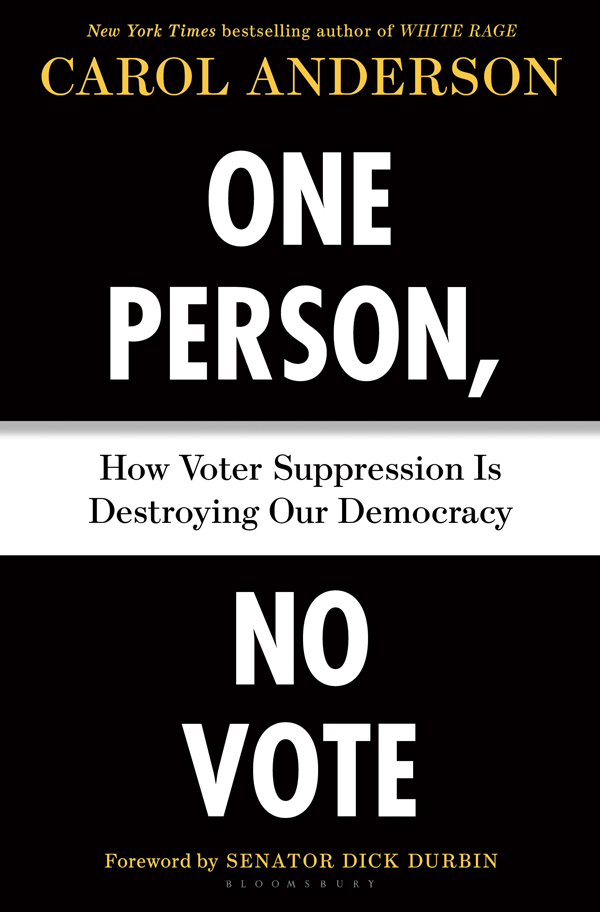Contents
Guide
Pagebreaks of the print version


To all of the voting rights warriors and activists who have fought and continue to fight to protect Democracy
BY THE SAME AUTHOR
White Rage: The Unspoken Truth of Our Racial Divide
Bourgeois Radicals: The NAACP and the Struggle for Colonial Liberation, 19411960
Eyes off the Prize: The United Nations and the African American Struggle for Human Rights, 194 4 1955


Contents
Foreword
by Senator Dick Durbin
In White Rage , Carol Anderson gave us a carefully researched history of American civil rights and race politics from the Civil War to current times. Her work marched us through the painful chapters of Reconstruction, Jim Crow, the Great Migration, and the Civil Rights Movement to the battles we face today.
When I read White Rage , I recommended it to my Democratic colleagues in the U.S. Senate. Senator Harry Reid was so impressed that he invited Professor Anderson to address our Senate Democratic Conference. Her passion and scholarship made a real impact.
In her new work, One Person, No Vote , Carol Anderson turns her focus to the central issue of racial justice in our time: the right to vote.
Under the specious banner of combating voter fraud, the Republican Party has launched a nationwide voter suppression effort. Using voter ID laws, reduced voting opportunities, gerrymandering, and even the national census, Republicans clearly believe their future success depends more on constricting rather than convincing the electorate.
When you follow the money behind this national push, the usual suspects surface. The Koch brothers and their allies bankroll operatives like the American Legislative Exchange Council (ALEC). They produce model legislation to combat alleged voter fraud by requiring photo identification at the polls. Republican legislators pass and Republican governors sign these laws, which restrict and discourage voting by minorities, the elderly, the young, the pooranyone who might oppose their partisan agenda.
The rationale for these laws has been repeatedly debunked. For example, a 2014 analysis by Professor Justin Levitt of Loyola Law School, Los Angeles, found only thirty-one incidents of voter fraud out of hundreds of millions of votes cast since 2000.
In 2012, as chairman of the U.S. Senate Judiciary Committees Subcommittee on the Constitution, Civil Rights, and Human Rights, I chaired national hearings on barriers to the ballot in Ohio and Florida, states that had recently passed restrictive voting laws. We called election officials of both parties, put them under oath, and asked a simple question: What was the incidence of voter fraud or voter irregularity in your state which gave rise to these state laws restricting voters rights? Their answer was the same in both states: There were few incidents, and virtually none was worthy of prosecution.
This lack of evidence underscores an ugly truth: Its not voter fraud that has inspired this new wave of voter suppression laws. Instead, its the same animus that led to poll taxes, literacy tests, and the infamous Mississippi Plan, which became the template for voter discrimination for decades. That ugly animus was denounced in 2016 by a three-judge federal appeals court that examined a 2013 North Carolina voting law that required strict voter photo identification and limited early voting. The law, the judges wrote, target[ed] African Americans with almost surgical precision. This was no coincidence, the court found, noting that before enacting [the] law, the legislature requested data on the use, by race, of a number of voting practices. Upon receipt of the race data, the General Assembly enacted legislation that restricted voting and registration in five different ways, all of which disproportionately affected African Americans.
Unfortunately, this movement is not confined to state legislatures. In his 2005 confirmation hearings to serve as Chief Justice of the United States Supreme Court, John Roberts said that the right to vote is preservative of all the other rights. His new black robe was barely wrinkled eight years later when, in the Shelby County v. Holder case, he cast the deciding vote to overturn a key provision of the Voting Rights Act requiring preclearance of new election laws in states with a history of voter discrimination. The Republican-dominated Supreme Court gave a green light to the No Vote Republican strategyand the Voting Rights Act, which had enjoyed virtually unanimous bipartisan support in Congress as recently as 2006, became a casualty of the GOP voter suppression campaign.
Since then, efforts to restore the Voting Rights Act through measures such as the Voting Rights Amendment Act and the Voting Rights Advancement Act have stalled in Congress. Meanwhile, Republican-led state legislatures continue to enact laws making it harder for a significant number of Americans to exercise their fundamental right to vote.
Evidence suggests that their plan is working. A recent study found that in the 2016 election, Wisconsins voter ID law deterred nearly 17,000and perhaps as many as 23,000eligible voters in two counties from casting ballots. President Trumps margin of victory in Wisconsin was only 22,748 votes.
In her Shelby County dissent, Justice Ruth Bader Ginsburg noted that though progress had been made in protecting the vote, Congress reauthorized the Voting Rights Act in 2006 because the scourge of discrimination was not yet extirpated. She was right.
As Carol Anderson makes clear in One Person, No Vote , the right to vote is under even greater assault today. For the sake of those who fought and died for it, it is up to all of us to insist that this most basic American right be protected. Reading this well-crafted book will arm you with the facts.
It was a mystery worthy of Raymond Chandler. On November 8,
It is true that, nationwide, black But its more than that. The disappearing minority voter is the campaigns most misunderstood story.
One Person, No Vote seeks to change that.
The millions of votes and voters that disappeared behind a firewall of hate and partisan politics was a long time in the making. The decisions to purposely disfranchise African Americans, in particular, can be best understood by going back to the close of the Reconstruction, the plan was to take years of state-sponsored trickery and fraud and transform those schemes into laws that would keep blacks away from the voting booth, disfranchise as many as possible, and, most important, ensure that no African American would ever assume real political power again.
The last point resonated. Reconstruction had brought a number of blacks into government. And despite their helping to craft the laws relative to finance, the building of penal and charitable institutions, and, greatest of all, the establishment of the
That became most apparent in 1890 when the Magnolia State passed the Mississippi Plan, a dizzying array of poll taxes, literacy tests, understanding clauses, newfangled voter registration rules, and good character clausesall intentionally racially discriminatory but dressed up in the genteel garb of bringing integrity to the voting booth. This feigned legal innocence was legislative evil genius.


